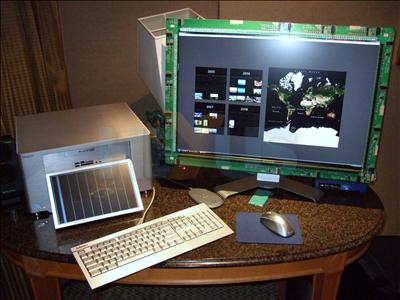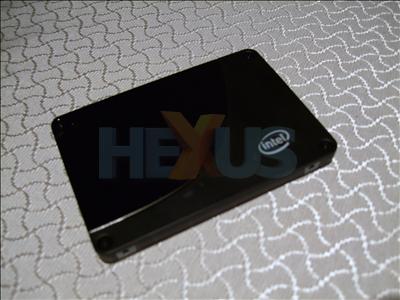At an Intel Technical Performance session at COMPUTEX '08, we were provided with a few mildly interesting tidbits. Teasers, if you will, of what we'll be hearing more about later in the year.
The session kicked off with Intel's Nick Knupffer, declaring his love of the GPU. Despite recent altercations with NVIDIA, Knupffer states that Intel understands the need for the GPU - and just so happens to be making one, he adds.
Following Knupffer's failed attempt at soothing the conflict between Intel and NVIDIA, Intel's senior performance analyst Francois Piednoel, was on hand to demonstrate a Nehalem-based system. Francois, as you'd expect, was using a machine that had him grinning from ear-to-ear:
The system, pictured above, had a "massively overclocked" Nehalem processor at its heart. Unfortunately for us, the Intel representatives wouldn't state its actual clock speed. Francois stated only that we wouldn't believe him if he told us.
Wanting to keep Nehalem tightly under wraps, Francois used unorthodox methods of demonstrating its power. Rather than the benchmarks we'd expect to see, we were forced to witness how quickly a "massively overclocked" Nehalem system can open applications such as Microsoft Word.
Granted, Word and various other applications opened and responded instantly, but we were still slightly shocked at the performance-demonstrating measures on display from the world's biggest semiconductor manufacturer.
The apparent performance, however, wasn't solely thanks to Nehalem. The system was instantly responsive thanks to two of these, says Francois:
Yep, two of Intel's 80GiB SSDs configured in RAID 0. To help demonstrate the SSD performance, Francois fired up an antivirus suite and began to scan his 160GiB setup. It did seem lightning quick, but Francois still wasn't willing to wait for it to finish - it takes about 16 minutesin total, he claims.
Despite our desire for raw performance figures, the system was fast, there's no denying that. Francois added that antivirus software is no longer hampered by the hard drive. In his demonstration, CPU utilisation hit 99 per cent on numerous occasions as the SSD sped through the virus scan with ease.
Intel wouldn't provide pricing or release dates for its SSDs, but it clearly has high hopes for them.
















